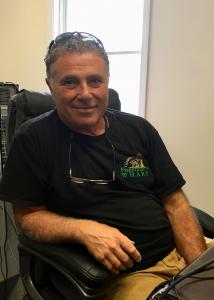Vito Giacalone

Strengthening Community Resilience in America’s Oldest Seaport
In partnership with the Northeast Fisheries Science Center, these oral history recordings capture the invaluable life experiences of long-lived members of Gloucester's working waterfront, one of the oldest fishing communities in the United States.
On August 23, 2019, Molly Graham interviewed Vito Giacalone for the Strengthening Community Resilience in America’s Oldest Seaport oral history project. Giacalone was born in Gloucester, Massachusetts, in 1959. Vito is a third-generation fisherman in Gloucester and started in the fishing industry as a youth. In the late 1980s, Giacalone took a break from fishing to work in construction until he came back to commercial fishing in 2000. He serves as the Policy Director for the Northeast Seafood Coalition and President of the Gloucester Fishing Community Preservation Fund. He and his wife Jenny own the fishing vessel Jenny G. and Fishermen's Wharf Gloucester. In the interview, Giacalone discusses his family history and involvement in fishing. He describes how his mother's family immigrated from Sicily and settled in Gloucester as fishermen. His father, also named Vito Giacalone, immigrated from Sicily and became a fisherman in Gloucester as well. He explains that his grandparents engaged in subsistence fishing in Sicily, focusing on catching what they needed for their families and to sell at the market. When they arrived in the US, they became involved in various fishing methods, including rowing out to set drift nets and later using double-ended boats called Guinea trawlers. Giacalone says that his grandfather became a doryman, responsible for passing the baton between the mother boat and the seine boat during purse seine fishing. He goes on to mention that fishing was passed down through generations in his family, with his father and uncles being fishermen. He talks about his early experiences in fishing and how he started working at the docks at a young age. He says his father taught him to fish, and his seven uncles on his father's side were also fishermen. He discusses how he eventually joined his father's fishing boat, the St. Peter, and the crew members on the boat, who were mostly Sicilian. He also mentions the transition of the fishing fleet from primarily Sicilian to a mix of Sicilian and Portuguese crews. Giacalone talks about the type of fishing he did, which included offshore and inshore dragging, mentioning the impact of the Hague Line decision in the 1980s, which led to the loss of fishing grounds on Georges Bank. He also mentions the over-capitalization of the fishing fleet and its effects on the industry. Later, he explains how he transitioned from fishing to the construction business with his brother after an opportunity arose to develop a property. Giacalone then talks about how his sons joined the fishing business in 2008 against his wishes. Initially, Vito had bought a new boat to fish part-time but ended up dedicating several months to help his sons start their own fish business called Fisherman's Wharf Gloucester. Giacalone shares information about the history of Fishermen's Wharf Gloucester, mentioning that the original business was purchased in 1951 by a group of Sicilian fishermen who wanted more control over their catch. The wharf operated successfully until the next generation of fishermen aged out or left the industry, leading to the wharf's demise. He explains that the original Fishermen's Wharf Gloucester, who owned the wharf, went bankrupt after a fire. His sons later established their business under the same name. He discusses how they obtained a loan with him as the contractor and built a new facility, which they moved into in 2011. Despite the business's success, Giacalone mentions that the fishing industry is volatile, with only a handful of boats left and the future uncertain due to retiring boat owners and competition for business.
Please Note: The oral histories in this collection are protected by copyright and have been created for educational, research and personal use as described by the Fair Use Doctrine in the U.S. Copyright law. Please reach out Voices@noaa.gov to let us know how these interviews are being used in your research, project, exhibit, etc. The Voices staff can help provide other useful resources related to your inquiry.
The NOAA mission is to understand and predict changes in climate, weather, oceans, and coasts, to share that knowledge and information with others, and to conserve and manage coastal and marine ecosystems and resources. The Voices Oral History Archives offers public access to a wide range of accounts, including historical materials that are products of their particular times, and may contain offensive language or negative stereotypes.
Voices Oral History Archives does not verify the accuracy of materials submitted to us. The opinions expressed in the interviews are those of the interviewee only. The interviews here have been made available to the public only after the interviewer has confirmed that they have obtained consent.
